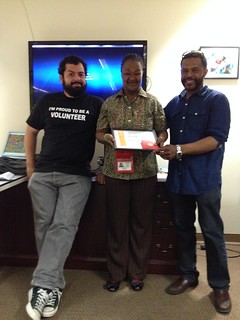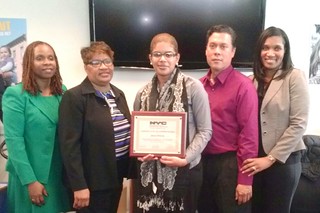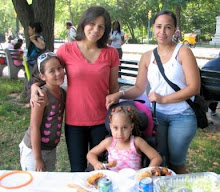For more information please visit our Website:http://sinergiany.org/node/1302
Thursday, November 13, 2014
Case Management Services Available in Manhattan
For more information please visit our Website:http://sinergiany.org/node/1302
Friday, October 31, 2014
Education Committee Hearing of the City Council
 On October 28 the Education Committee of the City Council
held a hearing to examine DOE’s ongoing efforts to improve instruction for
students with disabilities. The Metropolitan Parent Center submitted testimony
on behalf of the many parents it serves stating that it believes “the DOE falls
short in its endeavor to meet its responsibility to provide students with
disabilities with their right to a Free Appropriate Public Education.” Under
IDEA the District has a mandate to oversee and supervise the progress of the
special education programs. As such, the MPC recommends that the DOE conduct a
comprehensive assessment of the effectiveness of its initiatives.
On October 28 the Education Committee of the City Council
held a hearing to examine DOE’s ongoing efforts to improve instruction for
students with disabilities. The Metropolitan Parent Center submitted testimony
on behalf of the many parents it serves stating that it believes “the DOE falls
short in its endeavor to meet its responsibility to provide students with
disabilities with their right to a Free Appropriate Public Education.” Under
IDEA the District has a mandate to oversee and supervise the progress of the
special education programs. As such, the MPC recommends that the DOE conduct a
comprehensive assessment of the effectiveness of its initiatives. See more at: http://sinergiany.org/node/1297
Thursday, August 14, 2014
People with Developmental Diabilities and the Police - A Safety Issue
One year ago on Long Island, a 29-year old resident of a group home for people with developmental disabilities died after police used stun guns and pepper spray during a 10-minute struggle in the home where he lived.
Dainell Simmons had lived in the group home in Suffolk County on Long Island since it opened six years earlier. Police reported that staff at the facility called 911 to request assistance transporting him to a psychiatric emergency room after he "created a disturbance" in the facility, running around and banging into the walls for about half an hour.
By the time police arrived, Dainell had calmed down and was sitting on a couch talking to staff. Police claim he assaulted them when they attempted to handcuff him for transport to the emergency room. A struggle ensued, and police used stun guns at least twice, as well as pepper spray. After being handcuffed, Simmons lost consciousness and was pronounced dead at a nearby hospital.
Dainell Simmons had lived in the group home in Suffolk County on Long Island since it opened six years earlier. Police reported that staff at the facility called 911 to request assistance transporting him to a psychiatric emergency room after he "created a disturbance" in the facility, running around and banging into the walls for about half an hour.
By the time police arrived, Dainell had calmed down and was sitting on a couch talking to staff. Police claim he assaulted them when they attempted to handcuff him for transport to the emergency room. A struggle ensued, and police used stun guns at least twice, as well as pepper spray. After being handcuffed, Simmons lost consciousness and was pronounced dead at a nearby hospital.
Police characterized him as "emotionally disturbed," a term that appeared in many of the news stories. Comments following one of the stories on the web included two former staffers who said they knew Simmons, and that he was diagnosed with autism. Both said that, handled competently by properly trained professionals, the situation could have been resolved without the use of weapons.
In response to Simmons' death, one parent of an adult group home resident began a petition to mandate training for first responders on interacting with people with disabilities.
In February, 2013, a 26-year old man with Down Syndrome died of asphyxiation after police restrained him face-down on the ground when he failed to leave a theater at the end of a movie. The death was ruled a homicide, but a grand jury failed to indict any of the officers who responded.
In response to Simmons' death, one parent of an adult group home resident began a petition to mandate training for first responders on interacting with people with disabilities.
In February, 2013, a 26-year old man with Down Syndrome died of asphyxiation after police restrained him face-down on the ground when he failed to leave a theater at the end of a movie. The death was ruled a homicide, but a grand jury failed to indict any of the officers who responded.
In Toronto in 2011, a 45-year old man who was unable to speak as a result of traumatic brain injury he sustained as a child was beaten with batons when he failed to respond to police questions. He collapsed and died later, possibly of a brain hemorrhage.
The civil rights movement for people with disabilities resulted in massive "deinstitutionalization"--the closure of long-term facilities where people with disabilities were locked up and forgotten--and the right for people with developmental and psychiatric disabilities to live in the community. What was supposed to follow--support and services in the community to ensure the opportunity for full and equal engagement in society--has never fully materialized.
While the demand for more training for police as a short-term response may prevent some tragedies such as the killing of Dainell Simmons, longer-term solutions involve more and better housing with clinical support available at home, and more and better care in the community. This would minimize the need for trips to the psychiatric emergency room and short-term hospitalizations, which are traumatic and disruptive of people's lives.
Crisis response, when still needed, should be performed and supervised by trained, knowledgeable people, rather than police officers primarily trained to take lawbreakers into custody.
The civil rights movement for people with disabilities resulted in massive "deinstitutionalization"--the closure of long-term facilities where people with disabilities were locked up and forgotten--and the right for people with developmental and psychiatric disabilities to live in the community. What was supposed to follow--support and services in the community to ensure the opportunity for full and equal engagement in society--has never fully materialized.
While the demand for more training for police as a short-term response may prevent some tragedies such as the killing of Dainell Simmons, longer-term solutions involve more and better housing with clinical support available at home, and more and better care in the community. This would minimize the need for trips to the psychiatric emergency room and short-term hospitalizations, which are traumatic and disruptive of people's lives.
Crisis response, when still needed, should be performed and supervised by trained, knowledgeable people, rather than police officers primarily trained to take lawbreakers into custody.
High Temperatures on School Buses
The Office of the Public Advocate, Leticia James, has received complaints regarding high temperatures on school buses. Children with special needs who receive bus service may have certain accommodations, such as an air conditioned bus, on their Individualized Education Programs (IEPs). If your child requires a properly air conditioned bus but has not been provided with one, or if your child is riding a bus with a broken air conditioner, Public Advocate James' staff will mail you a thermometer that can record temperature changes by the hour and store the information. The thermometer can be easily attached to your daughter's or son's clothing and is a great way to get an accurate read on the temperatures within buses.
To be mailed a thermometer, please email the following information to bsherman@pubadvocate.nyc.gov :
1) Your name
2) Your address
3) Your child's name
4) School
5) Bus Route
6) Bus Company
7) Bus #
8) Complaint #s
9) Documents
10) Your child's IEP
11) Any correspondence concerning your child's transportation
If you know of other parents who might have the same problem with poor or non-working air conditioners on buses, please forward this email.
1) Your name
2) Your address
3) Your child's name
4) School
5) Bus Route
6) Bus Company
7) Bus #
8) Complaint #s
9) Documents
10) Your child's IEP
11) Any correspondence concerning your child's transportation
If you know of other parents who might have the same problem with poor or non-working air conditioners on buses, please forward this email.
Safety Kit for Parents of Children and Youth with Autism
We are all aware of situations via the media where children with autism wander off from their parents, programs and places. Sometimes this behavior has tragic results as in the case of Avonte Oquendo, a teenager with autism who liked to run and was able to leave the school building he was in. Unfortunately, wandering behavior resulted in the death of this young man.
For families affected by autism, having a safety plan is always important and the organization, Autism Speaks, the world's leading autism science and advocacy organization, has risen to the occasion by providing to parents and caretakers of individuals with autism, the "Big Red Safety Box." This is a valuable tool designed to educate, raise awareness and share simple tools that can assist in preventing, and responding to, wandering-related incidents.
The Big Red Safety Box contains educational materials, such as a caregiver checklist, a Family Wandering Emergency Plan, a sample IEP letter that can be used to implement prevention and response protocols in school, along with safety products, including two GE Door Alarms, one Who's Shoe ID, and five laminated adhesive stop sign visual prompts for doors and windows.
The Autism Initiative Program of Sinergia has received a number of these safety kits that have been distributed to families of children and youth with autism. If you are interested in learning more about this opportunity, please contact:
autisminitiative@sinergiany.org
It is very important to note that if you have a family member who experience behavior that interferes with their ability to recognize danger or stay safe, it is critical that you maintain close supervision and security in all surroundings and situations. For more information and ways to prevent wandering-related incidents, please visit http://awaare.org. You can also find additional resources at:
http://www.autismspeaks.org/wandering-resources
For families affected by autism, having a safety plan is always important and the organization, Autism Speaks, the world's leading autism science and advocacy organization, has risen to the occasion by providing to parents and caretakers of individuals with autism, the "Big Red Safety Box." This is a valuable tool designed to educate, raise awareness and share simple tools that can assist in preventing, and responding to, wandering-related incidents.
The Big Red Safety Box contains educational materials, such as a caregiver checklist, a Family Wandering Emergency Plan, a sample IEP letter that can be used to implement prevention and response protocols in school, along with safety products, including two GE Door Alarms, one Who's Shoe ID, and five laminated adhesive stop sign visual prompts for doors and windows.
The Autism Initiative Program of Sinergia has received a number of these safety kits that have been distributed to families of children and youth with autism. If you are interested in learning more about this opportunity, please contact:
autisminitiative@sinergiany.org
It is very important to note that if you have a family member who experience behavior that interferes with their ability to recognize danger or stay safe, it is critical that you maintain close supervision and security in all surroundings and situations. For more information and ways to prevent wandering-related incidents, please visit http://awaare.org. You can also find additional resources at:
http://www.autismspeaks.org/wandering-resources
Inclusion of English Learners with Disabilities in English Language Proficiency Assessment.
The office of Elementary and Secondary Education (OESE) and the Office of Special Education and Rehabilitative Services (OSERS), in July released guidance to States and LEA’s regarding inclusion of English Learners with Disabilities in English Language Proficiency Assessments. To read the full document……….
For parents of EL’s with disabilities, two important questions regarding the role of the IEP team were included in the question and answer guidance document to States and LEA’s.
The Role of the IEP Team
For parents of EL’s with disabilities, two important questions regarding the role of the IEP team were included in the question and answer guidance document to States and LEA’s.
The Role of the IEP Team
What is the responsibility of the IEP Team in determining
how ELs with disabilities participate in the annual State ELP assessment?
Decisions
about the content of a student’s IEP, including whether a student must take a
regular State assessment (in this case, the ELP assessment), with or without
appropriate accommodations, or an alternate assessment in lieu of the regular
ELP assessment, must be made by the student's IEP Team. These decisions cannot
be made unilaterally by a single teacher or other school employee outside of
the IEP process described in 34 CFR §§300.320 through 300.324.
The IEP
Team is responsible for developing the IEP for each student with a disability,
including each EL with a disability, at an IEP Team meeting which includes
school officials and the child’s parents.
(i) A statement of any individual appropriate accommodations
that are necessary to measure the academic achievement and functional
performance of the child on State and districtwide assessments consistent with
section 612(a)(16) of the Act; and
Should IEP Teams for ELs with disabilities include persons
with expertise in second language acquisition?
Yes.
It is important that IEP Teams for ELs with disabilities include persons with
expertise in second language acquisition and other professionals, such as
speech-language pathologists, who understand how to differentiate between
limited English proficiency and a disability. The participation of these
individuals on the IEP Team is essential in order to develop appropriate
academic and functional goals for the child and provide specially designed
instruction and the necessary related services to meet these goals.
It is
important that IEP Teams for ELs with disabilities include a public agency
representative who is qualified to provide or supervise the provision of
specially designed instruction to meet the unique needs of ELs with
disabilities. This representative should be knowledgeable about the
availability of agency resources needed to enable ELs with disabilities
to meaningfully access the general
education curriculum. This will ensure that the services included in the EL
student’s IEP are appropriate for the student and can actually be provided.
Source: Questions and
Answers Regarding Inclusion of English Learners with Disabilities in English
Language Proficiency Assessments – Guidance to Sates and LEA’s- Office of
Elementary and Secondary Education and Office of Special Education and
Rehabilitative Services ; July 2014.
Wednesday, June 25, 2014
Surf For All
On June 23, 2014 Sinergia took seventeen children with disabilities and families and several adults from our Day Program surfing at Long Beach, Long Island. The event was hosted by a non- profit organization, Surf For All that promotes surfing for children and adults with developmental disabilities. It is truly inspiring to see how the children and adults benefit from this activity.
The instructors were led by Cliff Skudin. All the surfing instructors are first rate and lovingly took out people on the surf boards, including one child who uses a wheel chair and an individual who is blind with intellectual disabilities.
Thanks also to lifeguard chief Paul Gallespi and Bryant Brattish. The trust that the participants exhibited as they faced and felt the waves is remarkable and a tribute to the fine instructors of Surf For All. The participants all received caps, sweatshirts and wrist bands.
The citizens of Long Beach have opened their a
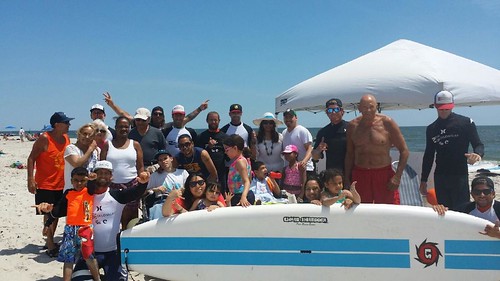 rms and hearts to Sinergia. After the surfing, the group was led to Gino's Pizza by police escort and patrolwomen Kelly Graham presented toy police badges, coloring books and crayons to the children.
rms and hearts to Sinergia. After the surfing, the group was led to Gino's Pizza by police escort and patrolwomen Kelly Graham presented toy police badges, coloring books and crayons to the children.
We thank Assemblyman Harvey Weisenberg, Len Torres, all the instructors and the police Department of Long Beach for making this a memorable occasion.
There will be two more surfing events in July 21 and August 18. If your family is interested in attending either date, please contact Godfrey Rivera, 212-643-2840. First come first served.
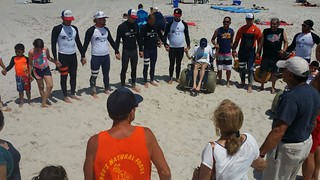
The instructors were led by Cliff Skudin. All the surfing instructors are first rate and lovingly took out people on the surf boards, including one child who uses a wheel chair and an individual who is blind with intellectual disabilities.
Thanks also to lifeguard chief Paul Gallespi and Bryant Brattish. The trust that the participants exhibited as they faced and felt the waves is remarkable and a tribute to the fine instructors of Surf For All. The participants all received caps, sweatshirts and wrist bands.
The citizens of Long Beach have opened their a
 rms and hearts to Sinergia. After the surfing, the group was led to Gino's Pizza by police escort and patrolwomen Kelly Graham presented toy police badges, coloring books and crayons to the children.
rms and hearts to Sinergia. After the surfing, the group was led to Gino's Pizza by police escort and patrolwomen Kelly Graham presented toy police badges, coloring books and crayons to the children. We thank Assemblyman Harvey Weisenberg, Len Torres, all the instructors and the police Department of Long Beach for making this a memorable occasion.
There will be two more surfing events in July 21 and August 18. If your family is interested in attending either date, please contact Godfrey Rivera, 212-643-2840. First come first served.

Autism Arts Program
 The Autism Initiative Program operated a special project that offered workshops, resources and a support group to parents of children with autism spectrum disorders (ASD) Paola Jordan, the coordinator established a collaboration with the Healing Arts Initiative (HAI) that provides arts programming to schools and non-profit organizations. The 12-week program met weekly from March 11 through June 3, 2014.
The Autism Initiative Program operated a special project that offered workshops, resources and a support group to parents of children with autism spectrum disorders (ASD) Paola Jordan, the coordinator established a collaboration with the Healing Arts Initiative (HAI) that provides arts programming to schools and non-profit organizations. The 12-week program met weekly from March 11 through June 3, 2014.The art program enabled children with Autism Spectrum Disorders and their parents, opportunities to engage in an afterschool art project with the children designing and making their own puppets. Eight parents and their children participated in this art program; one mother stated "this will be the first time that I will participate in a therapeutic activity with my son rather than waiting next door while the therapist does her work". The participation of the parents was a major component of the art program which reinforced the social and communication skills taught and which they could then put in practice in their homes.

The parents were encouraged to engage in the promotion and development of language and socials skills of
their children. A professional puppeteer created a variety of activities that lent themselves to these goals including storytelling, singing and other interactive activities. The parents enjoyed the opportunity to be engaged with their children as they worked together to create their puppets.
A video was produced of this program that will give you a good idea of the project and its intended outcomes.
Here is a link to the video on YouTube:
Sinergia's Autism Art program
A Day at the Beach
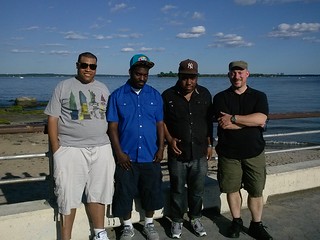 A day at the beach is always an uplifting and enjoyable experience. This trip to Orchard Beach is no exception. Pictured is the first outing that the Residential consumers had for the 2014 summer season. Blue skies, salty air and good friends were ingredients that made the day perfect for all who participated.
A day at the beach is always an uplifting and enjoyable experience. This trip to Orchard Beach is no exception. Pictured is the first outing that the Residential consumers had for the 2014 summer season. Blue skies, salty air and good friends were ingredients that made the day perfect for all who participated. The residential program at Sinergia encourages individuals to take the opportunity to enjoy natural and cultural experiences in order to lift their spirits and enrich their lives. The day was especially helpful in bringing consumers together so they could become more acquainted with one another. Everyday life keeps us all moving in different directions and the consumers also have a full day of programs, meetings and, doctor's appointments. An experience of nature and of community is the perfect remedy for the busy pace of life that the consumers can slip into while they grow toward their personal goals. Sinergia offers regular programs and experiences like this one
The residential program at Sinergia encourages individuals to take the opportunity to enjoy natural and cultural experiences in order to lift their spirits and enrich their lives. The day was especially helpful in bringing consumers together so they could become more acquainted with one another. Everyday life keeps us all moving in different directions and the consumers also have a full day of programs, meetings and, doctor's appointments. An experience of nature and of community is the perfect remedy for the busy pace of life that the consumers can slip into while they grow toward their personal goals. Sinergia offers regular programs and experiences like this oneto enrich the lives of
participating consumers.
A Palace For One
The joy was contagious as the individual moved into this new apartment sponsored and operated by Sinergia. "The highest standard of dignity" would be the phrase to describe the norm for all of our residences. Most people say they would like to move into this palace-for-one when they see the pictures. While in his residence, the indivdual receives the best of supervised living care. Residential Habilitation Specialists provide hands on support for the consumer as well as implement the care plans that are carefully constructed by many specialists who are part of the Sinergia team.

Day Hab Volunteer Ceremony
On May 2nd, the Sinergia Day Habilitation program honored its dedicated volunteers. Awards were presented to participants who regularly volunteer with our groups helping to prepare meals for the elderly at the St. Paul and Andrew's kitchen and with City Meals on Wheels. One individual was also recognized for volunteering her assistance in the Sinergia office. The Day Habilitation program is proud of the accomplishments of our Volunteers! Each of them works hard to help others in need and simultaneously learns skills that help them move towards their personal goals of finding employment or finding new ways to be involved in their communities.
Common Sense Parenting
In May, the Metropolitan Parent Center had a special series of workshops that concerned parenting skills. The series was called Common Sense Parenting provided by the organization known as Boys Town NY. Common Sense Parenting is a practical, skill-based parenting program that focuses on strategies and easy-to-learn techniques that address issues of communication, discipline, decision making, relationships, and self-control and school success. The workshops were very interactive and allowed parents to learn, practice and demonstrate new parenting skills. Workshops included instruction by a professional parent trainer, watching and discussing video scenarios of parent and child communication and behaviors. Parents also had the opportunity to practice techniques and strategies by engaging in role playing to help parents understand and how to use the tools that were being offered. There were two sessions offered, one was held on Thursday evenings for English speaking parents and the other session was conducted on Friday mornings for Spanish-speaking parents.
The trainer, Ms. Gonzalez was very competent and engaging, she displayed a good sense of humor and conveyed the workshop content fluently in both languages. In addition, materials (including a book and a workbook on parenting and food) were provided free of charge to the parents. The program was considered highly successful as indicated by parent feedback and program evaluations. Some parents were practicing some of the techniques they learned and stated that they were seeing positive changes in communicating with their children. The Metropolitan Parent Center will discuss with Boys Town the opportunity to offer this parent training program again during the upcoming school year. Please visit our Facebook page or the Sinergia calendar in the Fall to learn about the next scheduled parent training workshops.
The trainer, Ms. Gonzalez was very competent and engaging, she displayed a good sense of humor and conveyed the workshop content fluently in both languages. In addition, materials (including a book and a workbook on parenting and food) were provided free of charge to the parents. The program was considered highly successful as indicated by parent feedback and program evaluations. Some parents were practicing some of the techniques they learned and stated that they were seeing positive changes in communicating with their children. The Metropolitan Parent Center will discuss with Boys Town the opportunity to offer this parent training program again during the upcoming school year. Please visit our Facebook page or the Sinergia calendar in the Fall to learn about the next scheduled parent training workshops.
Thursday, April 17, 2014
Housing Placement Recognition
Sinergia was presented with a housing placement recognition award from the Department of Homeless Services (DHS). For over 30 years, S inergia has operated a Tier II program for homeless families with children with disabilities. The program is a transitional family stabilization program intended to help homeless families obtain permanent housing with the support services of case management and housing advocacy as well as wrap around and educational support services for children in the family.
Claudia Vidal, our Tier II and Respite Coordinator, received the recognition award on February 27th along with other shelters workers who also met their placement target. Claudia has been an excellent advocate for families living in the Tier II shelters and the children placed in our respite facility. She has a positive outlook and her pleasant calm demeanor, has improved the quality of living for the children and families in an exceptional manner. Sinergia applauds her great dedication to families in the homeless system and to individuals with disabilities and families that benefit from our respite services.
The Spring 2014 Somos el Futuro Conference
Once again Sinergia was represented at the Somos el Futuro Legislative Conference held in Albany on March 22nd. Sinergia and NYAEMP presented a workshop which discussed whether the Transformation of the NYS OPWDD service system for unserved/underserved individuals with disabilities was “of the people, by the people, and for the people? Panelists were Sinergia Executive Director Myrta Cuadra-Lash, Yvette Watts, Executive Director of the New York Assoc. of Emerging and Multicultural Providers, Yndhira Rodriguez (parent), Frank Ferreiras (consumer) and Robert Kehl (grandfather) who were accompanied by other parents and staff.
The workshop questioned whether “managed care” would bring full blown hospital-style mega-provider consolidation to the field of developmental disabilities and imperil the role of smaller, unique practitioners of community owned and operated multicultural, bilingual services and supports in which New York State has invested to impact communities of color. Also how the imposition of consolidation into DISCS and very large organizations into the system of very individualized and continuously changing lifelong community services and supports for and with people with disabilities affect person centered, multicultural, multilingual access to services and supports “in the most integrated setting” for minority and limited English people with disabilities.
It is important that through forums and other educational events that family members and community providers bring awareness of the role and the impact that our community organizations play in the lives of individuals and families with disabilities. Legislators and policy makers need to acquire a broader understanding of the need for these services to be supported and delivered in their communities. As a community based multi-service and multi-cultural, bilingual organization located in East Harlem, Sinergia is governed by a board of directors with a majority of parents and community residents. Services and supports are developed in response to the needs of the individuals and families we serve. The conference was an opportunity to inform the legislators and the public of the need to sustain smaller community based organizations that are of the people, by the people and for the people.
Legislative Breakfast
The 25th Legislative Breakfast sponsored by the Manhattan Developmental Disabilities Council’s took place on March 14th at Barnes and Noble in Union Square. The breakfast was attended by parents, providers, legislators and policy makers who came together to hear the testimonies of a panel of parents and a direct care provider. The OPWDD acting commissioner Laurie Kelly also participated and gave her support to the families and individuals with developmental disabilities.
Yndhira Rodriguez, mother of Julio Vega and an active member of the Sinergia family was chosen to present her story as a member of the panel. Yndhira has been a strong activist and advocate in raising autism awareness among the Latino population of New York City and increasing the knowledge and participation of Spanish speaking families. Thanks to her tenacity and enthusiasm, her son Julio has been able to access varied services that have made significant changes in his life. Mrs. Rodriguez is a leader and helps many other parents of children with autism obtain services, parent education, supports and recreational opportunities. We are honored to have such a committed and talented mother as part of our team of parents. We are hoping that her testimony will make an impact on the legislators and their representatives present at the event.
Yndhira Rodriguez, mother of Julio Vega and an active member of the Sinergia family was chosen to present her story as a member of the panel. Yndhira has been a strong activist and advocate in raising autism awareness among the Latino population of New York City and increasing the knowledge and participation of Spanish speaking families. Thanks to her tenacity and enthusiasm, her son Julio has been able to access varied services that have made significant changes in his life. Mrs. Rodriguez is a leader and helps many other parents of children with autism obtain services, parent education, supports and recreational opportunities. We are honored to have such a committed and talented mother as part of our team of parents. We are hoping that her testimony will make an impact on the legislators and their representatives present at the event.
Autism Rates Continue To Rise In Children
The percentage of American children
with autism jumped 30 percent between 2008 and 2010, according to a new report
released by the Centers for Disease Control and Prevention (CDC) which found
that 1 in 68 children had autism spectrum disorder in 2010, up from 1 in 88
children in 2008. The CDC report is based on a survey of medical records in
8-year-olds from 11 communities throughout the U.S.
The CDC can’t explain specific reasons for the rise. One reason stated may be that we are getting better at identifying autism.” Others say that autism is caused by a combination of genetic and environmental issues. The age of parents is also known to be a factor; the chances of autism increase when parents are older at conception.
However, certain patterns have remained the
same, autism remains five times more common in boys - affecting 1 in 42
compared to 1 in 189 girls. White children are more likely to be diagnosed than
black or Hispanic children, though the occurrence of autism in those minorities
has risen at a faster rate than for whites. A reason for this may be that
minorities, women and girls experience significant
under-diagnosis according to other experts.
The average age a child is diagnosed with autism has fallen, but still remains
above age 4 though diagnosis is possible by age 2. Research tells us that early identification of autism and the use of early
intervention services is crucial to
improving social, communication, behavioral and educational outcomes for
children with autism. That’s why it’s so important for every parent to
track their child’s development and act quickly if there may be a problem. Parents
know your child best. If you have a concern about how your child plays, learns,
speaks, acts, or moves, don’t wait. This link will tell what actions you can
take http://www.cdc.gov/ncbddd/actearly/concerned.html. You can also track your child’s development
with CDC’s free milestone checklists.
More is understood about autism than ever before, but there is a critical
need to continue the search for answers and provide help now for people living
with autism. For more details
about the CDC report, click on this link:
How State Budget Impacts On Persons With Developmental Disabilities
The 2014-2015 state budget recently adopted under the leadership
of Governor Cuomo will provide individuals with developmental disabilities new
opportunities for community integration and enhance the safety of individuals
we serve, while also providing significant enhancements for the staff that work
directly with individuals.
The budget provides a 2% compensation increase for direct support
professionals (DSPs) working for nonprofit providers effective January 1,
2015, and provides an additional 2% increase for DSPs and clinical staff
beginning April 1, 2015. The budget also provides funding to design a DSP
credentialing program to explore opportunities to improve the skills and
compensation for both state and voluntary sector DSPs.
Safe handling measures have been included in the budget to protect
the individuals we serve from being injured during transfers and reduce
injuries suffered by staff, prolonging their careers. Under this new law, the
Department of Health will establish a Safe Patient Handling workgroup by
January 1, 2015 to study best practices in safe handling; thereafter each
covered facility would establish a committee by January 1, 2016 to establish
safe patient handling policies which would be required to be in effect by
January 1, 2017.
An
$88 million increase in state and federal Medicaid matching funds is included
in the budget to support individuals and families entering the OPWDD service
delivery system, or requiring an enhanced array of services, and to help individuals
transition from institutional programs into community settings. Tax
credits are also provided for businesses who hire individuals with
developmental disabilities.
For
individuals seeking greater independence, the expansion of the Nurse Practice
Act exemption to non-certified settings will significantly expand supports
available to help individuals work in the community, and live where and with
whom they want. The budget also establishes an independent advocacy program to
help individuals with developmental disabilities navigate managed care, and
help ensure their rights are respected and appropriate services are delivered.
These budget investments will help strengthen the system of
support for individuals with developmental disabilities as we continue to
transition individuals to appropriate community opportunities.
Subscribe to:
Comments (Atom)





